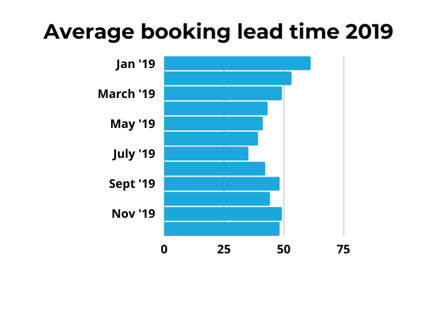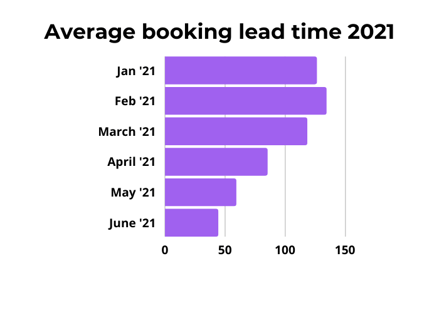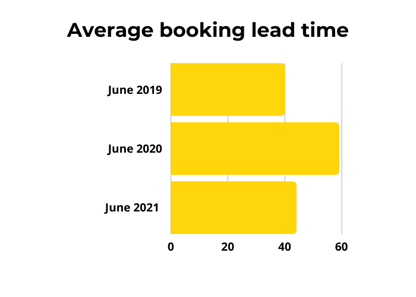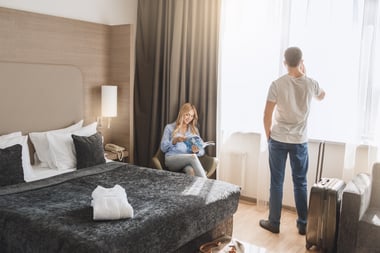Covid-19 didn’t invent shorter booking lead times. It did perpetuate them though.
Pre-pandemic, the hotel industry was noticing booking lead times gradually shortening over time due to changes in guests’ lives and their behaviour. Technology has molded our expectations as consumers of everything – that, and the rise of OTAs, has given guests more freedom to play around with their getaways and hotel stays. According to Revinate, nearly half (48%) of bookings made in 2018 were last minute – meaning they were booked within 7 days of check-in. Pre-Covid, global average lead time was 24 days. When we consider the colossal impact the pandemic has had on our already-changing habits as spenders, we need to look at everything together, as a whole, in order to gain the best understanding possible of guests in a post-pandemic world. When we look at the latest consumer trends, where are people at?
Firstly, many people are living more flexible lives. The number of people working remotely has grown 44%. This means people have more time to play around with, there are more opportunities for easy, last minute weekend getaways, now that people know they can work from virtually anywhere come Monday morning for example.
People are also looking for convenience. Again, this is no big surprise and no huge shift from where people were at pre-Covid – but it’s significant to understand this when considering the fact that shorter lead times are here to stay. It’s no longer always realistic or convenient for people to book their stays months in advance, especially domestically. Even without the up and down lockdown rollercoaster, people may continue to prefer booking with you a shorter time advance rather than months away.
We pulled our own data from 2019, comparing it to 2021 to note differences and to see how guest habits have shifted over time. This will give us an indication of where things may go into the future and should help you plan your revenue and marketing strategies accordingly based on this interesting guest behaviour.

Average booking lead time in 2019 across all of our clients in Ireland & Northern Ireland was 49 days. People seemed to book slightly longer in advance in the months of January (61 days), February (53 days), March (49 days), and November (49 days). Lead time was the shortest during the summer months, the shortest month being July (35 days).

In 2021 so far, we are all well aware that lockdowns, closures and reopening announcements have impacted the state of lead times and bookings globally. Looking at our own clients and their booking lead time data, people booked the furthest in advance in February (134 days), while people booked the shortest time in advance in June (44 days).

Comparing June 2021 with June 2020 and June 2019, we can see that people booked the longest time in advance in June 2020 (59 days). The shortest time people booked in advance was June 2019 (40 days) compared to June 2021, which as we mentioned, came in at 44 days.
Drawing parallels with change in cancellation patterns
Something else on the rise for years post-pandemic is hotel cancellation rates, due to an uptake in ‘book now, pay later’ culture. A positive point of note is that although cancellations were on the rise pre-pandemic, the book direct channel kept the lowest rate of cancellations.
Average cancellation rates moved from around 11.2% in 2017, to 12.8% in 2018 and 12.3% in 2019. We can’t fairly compare 2020 to other years, but in the interest of curiosity, we noted the average cancellation rate in 2020 to be 35.9%. It’s sitting at around 31% currently for 2021.
Why is this relevant?
The increase in cancellation rates as well as shorter booking lead times tells us we need to be watching data all the time. We can’t plan everything the same way we used to. As hoteliers, it will be important to move and grow with your guests, and being hyper aware of the data will help you do that.
How can you combat shorter booking lead times?
Convenience is key
Going back to our earlier point on convenience, the first thing you can do it make sure your path to purchase is as short, concise and easy to get through as possible. Let your guests know that booking direct is the cheapest and most beneficial thing for them to do. Remind them they’ll get the best deal with you!
Make sure you have a booking engine that recaptures a guest if they abandon the booking journey half way through for whatever reason. You should be able to create a pop up that brings them back to the booking window or be able to send an automated email to entice them back to where you need them to be.
Do you know your guests well enough?
Knowing your guests is one of the golden keys to success. We’ve spoken a lot about the new guest post-pandemic lately, and we can’t stress the importance of taking the time to know your guests enough (for more, read: Building guest personas reflective of a more complex world and Attracting ‘workationers’ to your hotel). When you know them better, you can segment them, and refine your offers and communication to better suit their habits and preferences (having a good CRM system in place can also help with this). Analysing the different lead times from different types of guests (are they young, old, remote workers, international etc) will help you target them better, and also new guests who match their demographic.
The main thing to remember is with the world and guests within it changing at lightening speed, be aware and prepared for shorter booking lead times. If you need any further advice, please send us a mail on hellp@netaffinity.com



